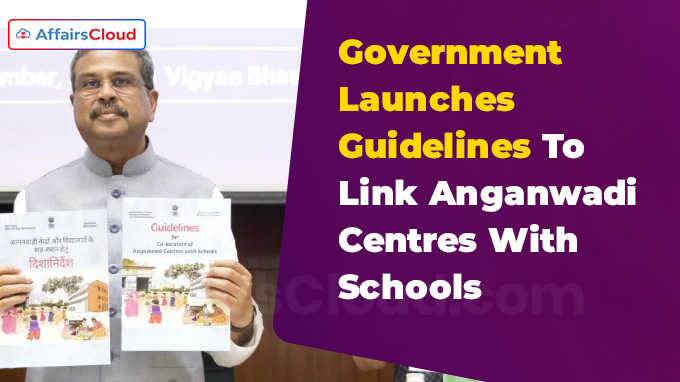 On September 3, 2025, Union Minister Dharmendra Pradhan, Ministry of Education (MoE), and Union Minister Annapurna Devi, Ministry of Women & Child Development (MoWCD), jointly launched the ‘Guidelines for Co-location of Anganwadi Centres with Schools’ at Vigyan Bhawan in New Delhi, Delhi.
On September 3, 2025, Union Minister Dharmendra Pradhan, Ministry of Education (MoE), and Union Minister Annapurna Devi, Ministry of Women & Child Development (MoWCD), jointly launched the ‘Guidelines for Co-location of Anganwadi Centres with Schools’ at Vigyan Bhawan in New Delhi, Delhi.
- The guidelines have been developed by the Department of School Education & Literacy (DoSE&L), MoE, in collaboration with MoWCD.
Exam Hints:
- What? Launch of Guidelines to Co-locate Anganwadi Centres with Schools
- Who? Union Ministers Dharmendra Pradhan, MoE; and Annapurna Devi, MoWCD
- Where? New Delhi, Delhi.
- Guidelines Developer: DoSE&L(MoE), and MoWCD
- Purpose: For seamless transition of children from pre-school to Grade 1
- Integration: NIPUN Bharat Mission with Poshan Bhi Padhai Bhi
About Co-Location Guidelines:
Objectives: The key objectives of the guidelines are to facilitate school preparedness and a seamless transition from Anganwadi Centres (AWCs) to Grade 1 in Primary schools, to foster linkages between AWCs and primary schools to create joyful and stimulating learning environments.
- It also aims to enhance the retention rate of children at the primary level to gain higher achievement at different levels of learning.
Components: The guidelines emphasize the following core components:
- ECCE IN India: A Unified Vision
- Creation of Child Friendly Learning Environment
- Engagement of Community and Parents
- Role of various other Stakeholders in Co-location of AWCs to the primary schools
Co-Location: Under the initiative, AWCs will be physically located in the school premises to strengthen Early Childhood Care and Education (ECCE) and ensure continuity between early learning at AWC and formal schooling starting at Grade 1.
Co-location Models:The guidelines outline two models for co-locating Anganwadi Centres (AWCs) with schools:
- Physical Co-location: Where infrastructure permits, AWCs will operate within school premises.
- Mapping to Nearby Schools: In areas with limited facilities, AWCs will be linked to the nearest school.
- State education and women & child development departments will jointly assess feasibility for each location.
Relocation Guidelines:
- Priority: Centres without permanent buildings, operating in rented or inadequate spaces, and serving disadvantaged communities will be given precedence.
- Distance: In urban areas, relocation should be within 500 metres(m); in rural areas, within 1 kilometre(km).
Integration: The guidelines integrate the NIPUN(National Initiative for Proficiency in Reading with Understanding and Numeracy) Bharat Mission, a foundational literacy and numeracy upskilling initiative, MoE, with Poshan Bhi Padhai Bhi, an initiative of MoWCD.
- They encourage the use of Teaching Learning Materials (TLMs) such as Jaadui Pitara, e-Jaadui Pitara, and Adharshila, developed as per the National Curriculum Framework for Foundational Stage 2022 and aligned with National Education Policy (NEP) 2020.
Coverage: India has over 14.02 lakh functioning AWCs, with 2.90 lakh already co-located with 9.16 lakh government and government-aided schools.
About National Education Policy (NEP) 2020:
Launch: NEP 2020 was approved by the Union Cabinet in July 2020, replacing the National Policy on Education, 1986. It provides a comprehensive framework to guide the development of education in India from school to higher education.
Aim: It aims to make learning holistic, flexible, multidisciplinary, and aligned with the needs of learners and promote critical thinking, creativity, and digital literacy.
Pre-School: It recognizes ECCE as the foundation of learning by including three years of preschool in the 5+3+3+4 structure, encompassing Foundational stage (3 years of pre school and classes 1-2), Preparatory Phase (Classes 3-5), Middle Stage (Classes 6-8), and Secondary Stage (Classes 9-12).
Anganwadis: The policy proposes delivery through Standalone Anganwadis, Anganwadis within primary schools, Pre-primary sections in existing primary schools, and Standalone pre-schools, to ensure universal access to quality ECCE.
About Ministry of Education (MoE):
Union Minister – Dharmendra Pradhan(Constituency – Sambalpur, Odisha)
Minister of State (MoS) – Jayant Chaudhary(Rajya Sabha – Uttar Pradesh, UP); Sukanta Majumdar(Constituency – Balurghat, West Bengal, WB)




